

Open Here

Life is full of pre-established lanes and rules. But there’s a lot of freedom at Bates. We believe the best way to approach college is to find what makes you tick, and then build the coming years around it.
We’ll help you try things on for size — in the lab or on the basketball court or in the ceramics studio or wherever your interests lead — until you find what fits for you.
You’ll never feel like you’re just on a treadmill working toward a diploma. You’ll be too busy making connections across academic fields, job-shadowing alumni, learning in the community, and doing graduate-level research that you really, really care about.
Through it all, you’ll have our support to ask big questions — and you’ll find the courage to push through when there aren’t clear answers.

“Bates teaches us to focus, stand taller, keep a sense of bal an ce , a n d etaler ot o t h
e r s
with respect . ” —
Chantal B er r y Dal ton ’ 69
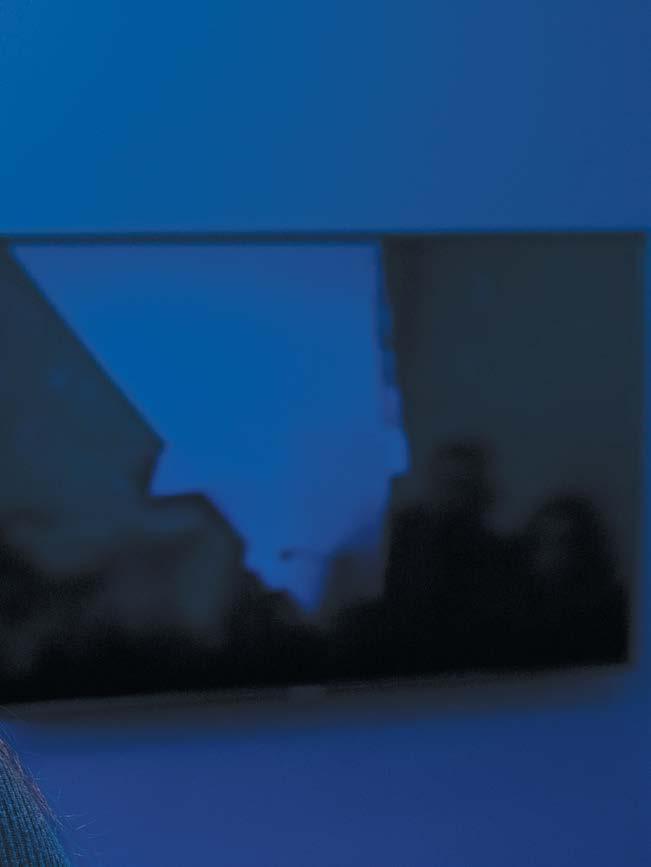
A BATES EDUCATION IS...
Open-minded
Bates students tend to be up for just about anything.
It’s a good thing we have about three dozen majors and two dozen minors to choose from.
Some are liberal arts classics (history, mathematics, philosophy). Some are STEM-focused (neuroscience, engineering, biochemistry). Many draw from more than one discipline (American studies, environmental studies, biochemistry, gender and sexuality studies).
Some won’t exist until you invent them.*
MAJORS AND MINORS
M = major m = minor

Students test out their computational neuroscience theses before hooking each other up to the EEG cap in the lab.
Africana (M, m)
American Studies (M)
Anthropology (M, m)
Art and Visual Culture (M)
Asian Studies (M, m)
Biochemistry (M)
Biology (M)
Chemistry (M, m)
Chinese (M, m)
Classical and Medieval Studies (M, m)
Dance (M, m)
Digital and Computational Studies (M, m)***
Earth and Climate Sciences (M, m)
Economics (M)
Educational Studies (m)
Engineering**
English (M)
Environmental Studies (M)
European Studies (M)
French and Francophone Studies (M, m)
Gender and Sexuality Studies (M, m)
German (M, m)
Greek (m)
Hispanic Studies (M, m)
History (M, m)
Interdisciplinary Studies (M)*
Japanese (M, m)
Latin (m)
Latin American and Latinx Studies (M)
Mathematics (M, m)
Music (M, m)
Neuroscience (M)
Philosophy (M, m)
Physics (M, m)
Politics (M)
Psychology (M)
Religious Studies (M, m)
Rhetoric, Film, and
Screen Studies (M, m)
Russian (m)
Sociology (M)
Teacher Education (m)
Theater (M, m)
* You can also design your own major with help from a faculty mentor.
** Students who choose to participate in the Engineering Combined Plan complete a portion of their education at Bates and a portion at one of our partner institutions: Case Western University, Columbia University, Dartmouth College, Rensselaer Polytechnic Institute, or Washington University in St. Louis.
*** Digital and Computational Studies was approved as a new major by the Bates faculty on March 3, 2025, available to the Class of 2027 and all subsequent classes.
Sara Moradi
You’re encouraged to experiment here. If you’re like Bates graduate Sara Moradi, you might start out super interested in politics and certain you want to go to law school.
You take an anthropology class your first year. Your professor invites you to do fieldwork in Montana and you LOVE IT.
Bates overwhelmed me in the best possible way,” she says. “It’s incredible how many resources there are on this campus.”
So you add anthropology as a minor.
Organize a noon meditation series for students, staff, and faculty
Study abroad in Stockholm, Sweden
Do a summer internship as a public affairs representative for Comcast
You also find time to
Join in social justice causes through the Center for Belonging and Community
Mentor other first-generation college students
Back on campus, you take an economics class because a friend swears you’ll like it. You discover — to your surprise — that you enjoy geeking out over the effects of quantitative easing on bond yields. So you go for a double major in politics and economics.
By senior year, you still want to go to law school. But instead of being a policy wonk, you decide to focus on immigration reform — because that’s where your heart is.
Tutor at a local high school
But then … GLENVIEW, ILL.
SHORT TERM, BIG IMPACT
Our calendar is based on two traditional semesters and one Short Term in the spring. It’s a time devoted to wide-open exploration (and at least a little basking in the sun after a cold winter).
We set aside about four weeks in May for you to take just one class or focus on a project of your own design.
Short Term courses usually involve fieldwork or off-campus travel — and professors have a blast coming up with the topics.
You might research the feasibility of green development in Kingston, Jamaica. Write, direct, and produce a short film in French. Or hunt for the spy in your midst during a class on intelligence and national security taught by an alumna who used to be a White House security advisor.
Students who don’t stay on campus or take classes gain an extra month of summer break. They often use the time for intensive internships, giving them added work experience before graduation.

A SAMPLING OF SHORT TERM COURSES
Practicum in Private Equity: Corporate Financial Decision
Making, from IPOs to LBOs taught by an alumnus who founded and runs a private equity firm
Health and Chinese Traditional Medicine taught at a hospital in Yunnan province with Bates professors and traditional Chinese medicine doctors
The Past, Present, and Possible Dystopian Future of Computing taught by an expert in computational neuroscience and evolutionary theory
Bordering Hispaniola: Blackness, Mixture, and Nation in the Dominican Republic examining the Dominican Republic’s place in the African diaspora


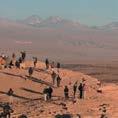
FallSemesterAbroad
EXPLORING SCIENCE AND IDENTITY IN CHILE
Bates’ Fall Semester Abroad (FSA) is just one way students study internationally. With its location changing each year, FSA allows you to study deeply and make unexpected connections while living in another country. Each FSA is taught by a pair of Bates professors, often working with faculty at a host university.
One recent offering, “Public Health and Culture in Chile,” is a prime example.
Public health might seem like an odd topic for a biochemist and a Latin American literature professor. But for FSA professors Glen Lawson and Claudia Aburto Guzmán, it was a natural fit.
Lawson says. “The connections are already there — you just have to uncover them and explore them.”
The professors addressed these connections in three courses. Guzmán taught “The Zombie Scare: Viruses, Difference, and the Question of Security and Order”; Lawson covered “Genetically Modified Organisms: Science and Latin American Perceptions”; and a Chilean colleague taught “Introduction to Public Health in Chile.”
Being in place
— in situ — has so many benefits,” Guzmán says. “It allows students to put into practice what is happening in the moment. The learning takes place at the intimate level, as well as at the academic level.”
“You can bring together the intersections of history, culture, and artistic expression with natural science in a straightforward way,”
Students lived with host families in Santiago. They also traveled to remote communities to see how modern medicine and indigenous beliefs intersect, had internships at health clinics in the city, and spent time in Santiago’s crowded subway system to imagine how the health implications of a virus might spread in a contained environment.
‘In situ’
One of the benefits of FSA is that students can sign up as a first year or a sophomore. Sophomore year is ideal, Guzmán says, because students are more willing to experiment before they’ve narrowed in on a major: “The state of wonder is very much intact."
FSA is also easy to access. While students gain language skills overseas, the program does not have a language prerequisite because the courses are taught in English. Travel costs are covered in Bates’ tuition, so students don’t have to worry about airfare, housing, or a meal plan — they can immerse themselves in new experiences.
Forging a Path
When Bates opened in 1855, it was New England’s first co-ed college. Since then, we have admitted students no matter their nationality, race, religion, sex, or socio-economic status. While this openness was at the core of our founding identity and principles, it has been tested throughout time and requires us to constantly reflect upon and recommit to our mission.
Our holistic admission and need-based financial aid practices and policies are missiondriven. They're grounded in a recognition of and respect for your background, what opportunities you've had, and what you've done with all that's been available to you.
We have a decades-long history of being test-optional (40 years, in fact). That means admission decisions are based on the whole picture of who you are — not just your SAT or ACT score.
Our founders knew that making this type of education open to as many people as possible would lead to future leaders, thinkers, and problem-solvers who could take on the defining issues of their generations. Graduates leave Bates willing and equipped to critique the world (and the institution itself). We believe this is the right way to educate.
That doesn’t mean building an inclusive culture is a simple task. Like other colleges and universities, Bates continues to grapple with the long-lasting effects of inequity in America and within our own institution.
While we’re making progress, we know that this is a far-reaching and complex process not of days, but decades. We invite you to join us.
The Class of 2027 arrives on campus. Students move into their new residences, attend meetings, eat lunch, pick up orientation trip equipment, hear the President’s Greeting on the Historic Quad, and say goodbye to their families.


There are no classes on the third Monday in January. Instead, students attend workshops and events dedicated to tackling the toughest issues, including race, racism, and oppression.
REV. DR. MARTIN LUTHER KING JR.
DAY OF OBSERVANCE
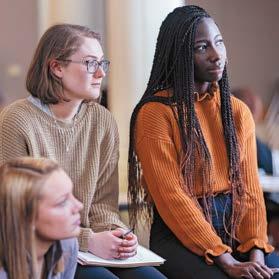
It’s about immersing yourself in cultures outside of your own, seeing the struggles that other people face, and how this country has used power structures in order to marginalize certain groups.”
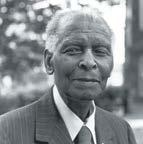
MLK Day is a reason we come to Bates,” says Kyle Larry '21. “One of the main purposes of this school is to create activists and to create advocates.”
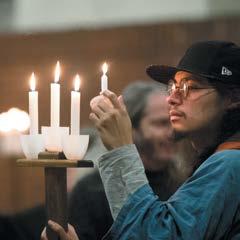
The day also includes a debate dedicated to Benjamin E. Mays, a 1920 alumnus and mentor to Rev. Dr. Martin Luther King Jr.
Mays was a standout member of the Bates debate team and later became president of Morehouse College. On MLK Day, members of the Morehouse debate team come to campus for a friendly competition.
It’s less about who wins than it is about sharing different perspectives, says Morehouse debater Hatim Mansori.
“I love being in this environment, and experiencing some of the debate fire that I would like to bring out in myself, through the lens of Benjamin Elijah Mays and Martin Luther King Jr.”
WHAT THE LIBERAL ARTS AND SCIENCES CAN DO FOR YOU
An education in the liberal arts and sciences at Bates prioritizes a broad, interdisciplinary curriculum that will help you develop skills of critical thinking, communication, and adaptability — exactly what you need to succeed in an ever-changing world.
Your coursework will transport you outside the walls of a classroom, sparking conversations and inspiring action.
For example, a religious studies major combined personal interests with academic research, examining cultural patterns in Jewish women comedians. A theater major collaborated with a mentor to explore their identity as a Black actor. And recently, two seniors used their environmental studies majors to help Bates secure major funding for new electric vehicles and EV chargers — blending academic knowledge with action.

The liberal arts and sciences helped Rishi Madnani of Langhorne, Pa., turn dreams into a life plan. Madnani majored in biochemistry at Bates. Now a medical student at Harvard, he is pursuing a career as a researcher, physician, and advocate for change.
Rishi Madnani of Langhorne, Pa., majored in biochemistry at Bates. Now a medical student at Harvard, he is pursuing a career as a researcher, physician, and advocate for change.
“My curriculum at Bates and real-world internships helped me refine exactly what I want to do, concretely and tangibly, in my life,” he says.
His ability to think through problems and find solutions — and learn about himself along the way — was also affected by coursework in another discipline in the liberal arts and sciences, anthropology, helping Rishi connect ideas about race, culture, and religion that have shaped his life as the son of immigrants. “Interdisciplinary thinking and engagement defines the beauty of the Bates education,” he says.
A Bates education gives you tools, mentorship, and community to make a difference — in your own life and in your community.
During her Purposeful Work internship at the Asian American Arts Alliance in New York City, Eileen Dockery ’26, an environmental studies major from Rye, N.Y., led the creation of a video highlighting the allyship between Asian American Pacific Islander and Black communities.

My curriculum at Bates and real-world internships helped me refine exactly what I want to do, concretely and tangibly, in my life.”
A BATES EDUCATION IS...
Open-hearted

“The power to end injustice is in each and every single one of us. ”
— Dolores Huerta, American labor activist and civil rights icon, speaking at Bates in 2019










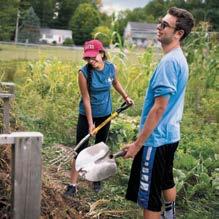
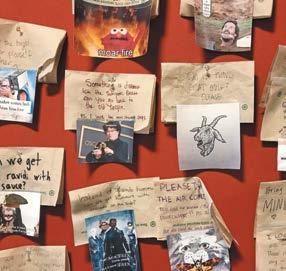
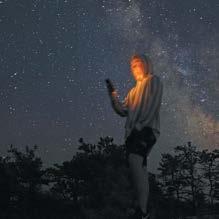
We know that college isn’t just about developing your intellectual side. It’s also a time to find the people you can lean on so you can thoughtfully and authentically test your limits.
Bates is a place where students hold doors open for each other. Our competitive streak is limited to games against our rivals in the New England Small College Athletic Conference (NESCAC). And our professors are more likely to ask, “How are you doing?” than “How are you doing in my class?”
You’ll see our community spirit at work in the library, which closes early on Fridays to make sure students get a study break and keeps a hot water kettle near the research desk for warm tea or cocoa in the winter.
Findusonsocial
@batescollege

You’ll find it between the lines of the Napkin Board in Commons, our central dining hall, where dining staff respond to each comment or suggestion with a personal note (or a meme).
Bates is special because our community gives you not just time, space, and resources to define your interests, but also the support to care for yourself along the way.
That way, you’re prepared to take the risks that will shape who you become.

LOCATION, LOCATI N, LOCATION

The renovated Bates Mill Complex, once a textile mill, now houses a seafood restaurant, a microbrewery, offices, and a city museum.
THE TWIN CITIES OF LEWISTON AND AUBURN, WITH THE ANDROSCOGGIN RIVER RUNNING BETWEEN THEM, ARE MILL TOWNS REBORN
With a combined population of about 60,000, the two cities offer the best of both worlds: a safe, close-knit community and a vibrant downtown.
Locals call the area L-A. It’s full of hard-working, independent-minded people who are building meaningful, interesting lives for themselves.
Inside factories that once powered the Industrial Revolution, you’ll find startups and brewpubs.
BATES
Lewiston, ME
Lisbon Street, Lewiston’s downtown shopping district, has cafes, bike shops, and galleries, all within a mile of campus. Thirty-four languages are spoken at the local high school, and you can get a plate of curried goat, a steaming bowl of phò, or steak au poivre within blocks of one another.
FREEPORT, ME (31 min/19.8 mi)
PORTLAND, ME (46 min/36.2 mi)
BOSTON, MA (2 hrs 17 min/139 mi)
NEW YORK CITY, NY (5 hrs 41 min/349 mi)
Many of our business owners are known for outstanding craftsmanship. The family behind Rancourt Shoes has made handsewn footwear in Lewiston for three generations. Bourgeois Guitars makes just 400 acoustic guitars a year, ensuring that each of their instruments has a unique tone and faultless construction. And what was once an artisan furniture mom-and-pop business, founded by former Bates professor Thomas Moser, is still family-owned but earns coverage in Architectural Digest.
For arts lovers, L-A also offers a professional theater company, a film festival, museums, and an underground music scene.
In other words, you could find many ways to get involved and make a difference here — and L-A could make a difference for you.
Bates College is located in the heart of Maine, close to mountains, the sea, and cities along the Eastern seaboard. Traveling by Uber, bus, train, or plane is only a click away.

Tales That Unite Us
STORYTELLING BRINGS TOGETHER L-A COMMUNITY
On a recent fall evening, a square of carpet in a downtown Lewiston bookstore became a confessional. Known as The Corner, Lewiston’s monthly storytelling event takes a similar format to national showcases like The Moth.
Bates professor Michael Sargent (left) launched the series a decade ago to help bring new energy to L-A’s nightlife and culture. Now, two former participants, Bates alumna Kate Webber ’11 and partner Steve Burger, host The Corner.
At a recent gathering, storytellers shared stories about the times they moved (something that new Bates students could talk about!) recalling first walks in their new town or first nights in a new bedroom.
Some stories provoke belly laughs. Others draw tears.
“People have a real desire to connect with other people,” Webber says. “Even if you come and quietly sit in a back chair and observe, you can still leave feeling like you’re more connected to this place.”
Every night is different, Burger adds. “Lewiston is not the stereotype of Maine. There is diversity in all senses of the word. The Corner thrives here because there are so many different stories to tell — and people genuinely listen to what you have to say.”
There’s also an element of community ownership, he says. The event is volunteer run and sponsored by dozens of local businesses. “It’s something that people buy into and feel like it belongs to them.”
Even if you come and quietly sit in a back chair and observe, you can still leave feeling like you're more connected to this place.”
Environmental Studies
HEAT AND LIGHT IN THE CITY OF THE FUTURE:
A Feasibility Study of Renewable Energy in Lewiston, Maine
Politics
WELCOMING NEW MAINERS: Local Economic Development and its Effects on the Politics of Immigration

Rhetoric, Film, and Screen Studies
THE CHORUS OF CINEMA: Experiments in Community Filmmaking Practices and Collective Storytelling in Lewiston-Auburn, Maine
Our Community
BEYOND THE CLASSROOM
Recent capstone research projects in Lewiston-Auburn
Economics
A MACHINE LEARNING APPROACH FOR PREDICTING INPATIENT DISCHARGE AT CENTRAL MAINE MEDICAL CENTER
Sociology
DRUG USE ON THE COAST: Examining the Opioid Epidemic in Maine Lobster Fishing Communities
REAL-WORLD EXPERIENCE
You can’t know what you love to do — and what you don’t — until you’ve tried it. So if you have an interest you want to explore, we’ll help you find an experience to match.
Hands-on work at Bates helps you connect classroom theories with the practical realities of the working world.
If you’re an art and visual culture major, you might have an internship at a local gallery.
If you’re considering a legal career, you could work for a state representative or intern for an environmental policy group.
And if you’re into math and economics, lots of our students have crunched numbers for leading insurance and financial services firms.
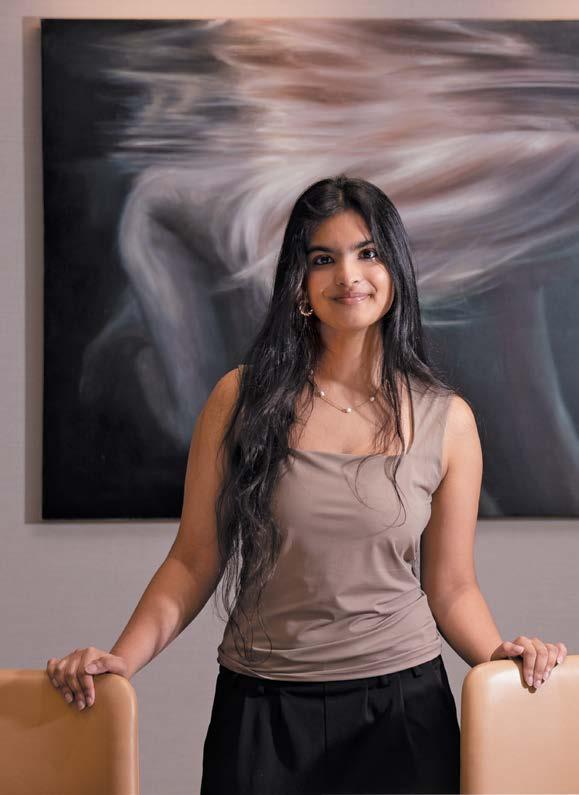
With Purposeful Work support, Aasya Patel ’26, an economics major and mathematics minor from Needham, Mass., interned at Wolfe Research in New York City, identifying market trends through financial data and learning valuable presentation skills from industry panel presentations.
TRY SOMETHING NEW
YOU’LL HAVE MANY CHANCES TO DIVE INTO THE UNEXPECTED AT BATES
Learn to surf with the Outing Club or perform a spoken-word piece at the weekly Village Club Series showcase. Test your technical skills with the High-Altitude Ballooning Club. Or your sense of rhythm with the Bollywood Dance Team.
With nearly 100 student-run clubs you’re sure to find something of interest. What you won’t find are fraternities or sororities. We’ve never had them. Never will.
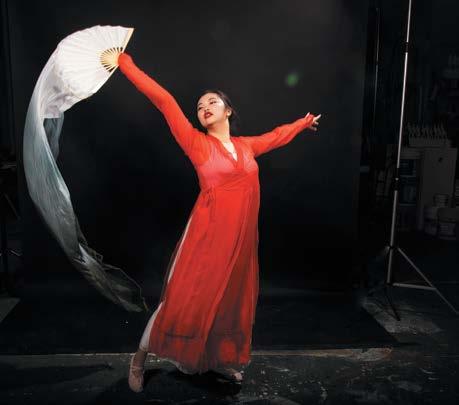
Join the Sangai Asia Club for a night of celebrating Asian and Asian American cultures through music, song, and dance at the annual Sangai Asia Night.

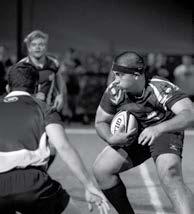
A Helping Hand
STUDENT-RUN EMERGENCY MEDICAL SERVICES OFFERS A CAMPUS SAFETY NET
When the Bates campus needs a quick response to injuries, illnesses, or anxieties, Bates EMS gets the call.
Staffed by trained student volunteers, Bates EMS delivers immediate care to students, staff, and faculty. Crew members earn state certification as medical technicians during Short Term, so they have the expertise to respond to a range of health issues.
The EMS team is on call 24/7, offering a safety net for the campus and giving its members first-hand experience in health care delivery. The crew also supports first responders in Lewiston, who may be miles away when something happens.
“The fact that Bates EMS can go from one end of campus to the other in about two minutes is really, really important,” says Jillian Sheltra ’19 of Portland, Maine.
At Bates, Sheltra worked with a local ambulance service that helps train Bates EMS volunteers, and after graduation she served as a paramedic for LifeFlight, Maine’s only air ambulance service — experiences that helped her gain admission to medical school at Tufts University.
“You’re the calm in the middle of this crazy storm,” she says. “You often show up on somebody’s worst day. And no matter if you’re on the simplest of calls or the most complicated medical call, people are happy that you’re there. That’s one of the most rewarding parts.”
You often show up on somebody’s worst day. And no matter if you’re on the simplest of calls or the most complicated medical call, people are happy that you’re there.”


Our professors are bright, driven, and among the top minds in their scholarly fields. They’ve chosen to teach at a school with a 10:1 student-faculty ratio because their priority is helping you learn.
Your professors will mentor you in class, advise you on your course selections, and help you ruthlessly edit your capstone projects.
Accessible Faculty GENUINE RELATIONSHIPS WITH PROFESSORS
You might do research or fieldwork with them. They may introduce you to alumni in your field of interest, or help you find opportunities to attend professional conferences.
They will certainly encourage you to think harder than you ever imagined.
OFFICE HOURS











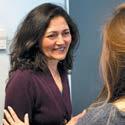








OF TENURED FACULTY HOLD THE HIGHEST DEGREE IN THEIR FIELD
FACULTY-STUDENT RATIO
NUMBER OF STUDENTS WHO DO FULL-TIME RESEARCH WITH FACULTY EACH SUMMER
AVERAGE CLASS SIZE
LarissaWilliams*

This zebrafish larva is four days old. An ideal research model due to its transparency and genetic similarity to humans, the species helps scientists study the effects of toxicants on both aquatic life and human health.

*andherall-stars




GroundbreakingDiscovery
HOW BATES STUDENTS HELPED EXPOSE A HIDDEN CHEMICAL THREAT
WHAT WAS DISCOVERED: A Bates professor and her student research team have uncovered harmful effects from everyday exposure to triphenyl phosphate (TPhP), a chemical used in fire retardants and some nail polishes. Published in the journal Toxics, their collaborative study was named an Editor’s Choice for its real-world significance.
WHO DISCOVERED IT: The energy and initiative of Bates students helped to drive the research project, which was guided by Associate Professor of Biology Larissa Williams and took place in the college’s state-of-the-art Bonney Science Center.
As a student, Ben Schmandt ’22 wanted to know more about how the chemical affects organisms at everyday, nanomolar concentrations. His early work with Williams laid the foundation for the research, which was picked up by succeeding students: Gabrielle Smart ’23, now a veterinary student at Washington State University, and Mfon Diduff ’24, who is pursuing public health research at Columbia University Irving Medical Center.
Schmandt, who is a research associate at the Broad Institute of MIT and Harvard, says the project helped him find “a passion for the specific ways the environment and genetics interact.”
The team’s study of zebrafish embryos and larvae showed that environmentally relevant levels of TPhP — found in parts per billion — caused developmental harm. The exposed zebrafish experienced stunted growth, heart swelling, and oxidative stress, raising concerns about potential human impacts.
WHY IT MATTERS: Zebrafish are a proven model for studying toxicants because they share about 80% of their DNA with humans. The research demonstrates that even low-level exposure to TPhP can have significant developmental effects, underscoring the need for more study on its potential human impact.
WHAT’S NEXT: Williams’ lab will explore how the timing of TPhP exposure affects embryonic development. The goal is to pinpoint when and how such chemicals cause harm during an organism’s development, paving the way for better understanding and prevention.
“We know TPhP is a widespread contaminant,” says Williams. “Now we know it’s likely a developmental toxicant, even at everyday levels. That’s worrisome.”
From top, Gabrielle Smart ’23, Ben Schmandt ’22, and Mfon Diduff ’24 helped uncover the harmful effects of an everyday chemical, laying the foundation for careers in veterinary medicine, research, and public health.
Bobcat Ventures
STUDENT-RUN STARTUP CLUB CONNECTS STUDENTS WITH ALUMNI
Bates trustee Chris Barbin ’93 wants to make sure this is quite clear: Bobcat Ventures is more than Bates’ version of Shark Tank
The pitch competition and its $10,000 prize have launched several student-run small businesses, including a temporary storage company inspired by Airbnb and a personal care brand that supports at-risk women in Lewiston-Auburn.
But as an informal advisor and judge of the competition, Barbin has also seen Bobcat Ventures grow into a powerful engine of connection for students and alumni.
“We’re encouraging them to keep their business moving forward, and helping them with guidance, counsel, and support — even after the competition itself,” he says.
At each stage, they attend workshops and get feedback from alumni entrepreneurs whose expertise includes executive coaching, launching technology startups, and investing in disruptive businesses.
“They’re able to talk about business concepts that come up in the workshops, and, ultimately, create a stronger bond between students and alumni who have been successful,” says senior Julien Lewin of Seattle, Wash., one of the club’s organizers.

ABOVE: Biruk Chafamo ’22 won the $10,000 top prize in the Bobcat Ventures pitch competition for a friend-tofriend lending app that facilitates small loans to people not well-served by traditional banks, a concept found in many countries, including Chafamo’s Ethiopia, where it’s known as ekub.
Over the course of a year, Bobcat Ventures students come up with a new business idea, research and write a business plan, and go through several rounds of simulated pitches to investors.
Bobcat Ventures judges often stay in touch with the winners after graduation, too. “I’ve watched the excitement on both sides when you make those connections,” Barbin says.
“It’s not just about exposing yourself as talent to somebody who’s going to hire you. It’s trying to really encourage entrepreneurship and give you some lessons learned for that — so it makes a workable connection with the alumni network as well.”
A Bobcat Ventures pitch competition winner is now a sustainable local resource for women. Herban Works is a product of the commitment and time that Ali Rabideau gave to Lewiston’s Center for Women’s Wisdom, and the startup helps the center pay its bills by making and selling herbal self-care products.

We’re encouraging them to keep their business moving forward, and helping them with guidance, counsel, and support — even after the competition itself.”

PURPOSEFUL, HANDS-ON LEARNING
EDUCATION HERE IS NEVER LIMITED TO THE CLASSROOM
Our mission is to help you become an active citizen of the world — or at least your corner of it. That means developing strong communication skills, solving problems by working together, and respecting people from different backgrounds and points of view.
There’s no better way to hone these skills than by practicing, then practicing some more.
So you’ll participate in internships, job shadows, fieldwork, and work in the community. You might earn a research fellowship. Or have a work-study job at a local nonprofit. You’ll take Short Term classes from successful alumni. You’ll sometimes push your comfort zone and always find yourself changed as a result.
Community Partnerships


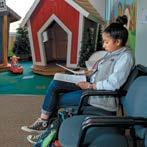
Collaboration with the community and learning by doing are key aspects of academics at Bates. These two elements, which we call community-engaged learning, come together at our nationally recognized Harward Center for Community Partnerships.
Through the Harward Center, you’ll have access to hundreds of hands-on experiences that will deepen your connection to Lewiston-Auburn and give you a chance to make a difference. These experiences often inspire students to dig deeper through independent research or a senior thesis.
What does community-engaged learning look like?
Environmental studies students do research on how renewable energy can cut costs for a local 127-acre vegetable farm. Students studying education spend at least 30 hours a semester working in nearby schools or after-school programs. Students interested in healthcare are invited to job-shadow surgeons, physician assistants, and radiologists at Central Maine Medical Center. And classical and medieval studies students work with staff at the Maine MILL museum in downtown Lewiston on a plan to digitize the museum’s archives.
COMMUNITY-ENGAGED LEARNING IN A TYPICAL YEAR
of Bates students take communityengaged courses
community-engaged classes are available
disciplines offer community-engaged courses
community-engaged internships, research projects, or independent studies take place
hours of academically driven community-engaged work are completed
Sustainability
BY THE NUMBERS
At Bates, caring for each other also means caring for our environment.
The college switches to green electricity
Annual savings from energy-efficiency measures
Bates goal date to achieve carbon positivity Bates becomes carbon-neutral
Campus boilers retrofitted to use renewable energy Student clubs focus on conservation and sustainability
Green Innovation Grants awarded each year for campus sustainability projects

Annual Trashion Show, where students model garments made from recycled and thrownaway materials
NATURAL WONDERS
Visitors are often surprised to find that along with academic buildings and residence halls, the Bates campus is home to both a “mountain” and a “lake.”
Lake Andrews is so little, we call it the Puddle. And at 381 feet, Mount David earns a description as a “tall rock outcropping” in a local trail guide. They’re ours — and we love them.
Mount David makes a great sledding hill on a snowy day. And every January the Outing Club cuts a hole in the lake for Puddle Jump, a longtime polar plunge tradition.
The geographic variety of Bates’ campus is also a good introduction to what makes living in northern New England special. Parts of Maine are wild and untouched.

The Bates-Morse Mountain Conservation Area,a600-acrelivinglaboratoryof protected salt marshes, dunes, and beaches,ismanagedbyBatesfor conservation, research, and education.
Parts are famous and majestic, like Acadia National Park. Others represent the culmination of a lifelong goal, like Mount Katahdin, the northern terminus of the Appalachian Trail.
Our pristine coast, vast mountain ranges, marshland, and rivers are ripe for exploration in all four seasons. They’re also within an hour’s drive of Lewiston.
Take Bates-Morse Mountain Conservation Area. This public nature preserve on the southern coast offers 600 acres of protected salt marshes, dunes, and beaches.
Bates manages the area for research and educational purposes — giving students another chance to explore Maine’s natural wonders, whether they’re studying physics, religion, or environmental science.
COURSES USING BATES-MORSE MOUNTAIN AS A CLASSROOM
Avian Biology
Lost Beaches of Maine
The Nature of Spirituality
Coastal Hazards
Conservation Biology
Earth Surface Environments and Environmental Change
Limnology and Paleolimnology of Maine Lakes
Sedimentary Processes and Environments
Brand Culture Building (Short Term practitioner-taught course)
OLYMPIANS

ATHLETICS
Bates is a charter member of the NESCAC. We compete against fellow conference members Amherst, Bowdoin, Colby, Connecticut College, Hamilton, Middlebury, Trinity, Tufts, Wesleyan, and Williams.
Bobcat pride runs deep. About 40% of our students participate in varsity sports each year.

ALL-AMERICA AWARDS
& ARTS
The performing and visual arts are well represented at Bates. Every year you’ll find hundreds of opportunities to express yourself — and to be inspired by leadingedge artists. That’s true whether you major in dance or physics.
WORKS IN THE BATES MUSEUM OF ART’S PERMANENT COLLECTION
INTERNATIONALLY CELEBRATED DANCE FESTIVAL
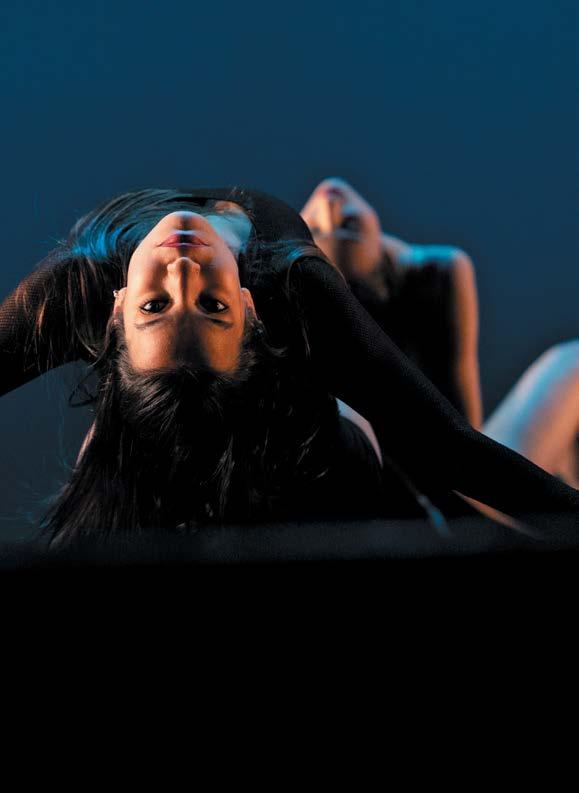
STUDENT CLUBS IN THE CREATIVE ARTS
MUSIC ENSEMBLES FOR STUDENTS
CAMPUS EVENTS, INCLUDING DANCE AND THEATER, INFUSED WITH ARTS AND HUMANITIES

A BATES EDUCATION IS...
Open-ended

"What is the value of your Bates education? You will learn how to construct arguments, how todevelop and You will learn how to learn. ” test theories, and how to critique and how to create.
— Andrew Mountcastle, biology professor
FIND YOUR PURPOSE
WITH BATES’ CENTER FOR PURPOSEFUL WORK
When you understand what drives you to learn, grow, and thrive, you’ll have a more satisfying relationship with work throughout your life. That’s the idea behind Purposeful Work at Bates.
Most colleges offer career counseling and help with job applications.
Our Center for Purposeful Work goes way beyond jobs or careers. We focus on the whole person — your beliefs, your strengths, your interests — and infuse concepts of meaningful work into all aspects of your time at Bates.
With each new Purposeful Work experience, you’ll consider whether a given role feels right for you, and why.
By the time you graduate, you’ll have a clear idea of the values you want reflected in your life after college. And you’ll have a professional network and the practical experience to help you make it happen.
Benjamin Morse ’24, a biology major from Sunderland, Mass., used his Purposeful Work internship to support the Gulf of Maine Research Institute’s cutting-edge efforts to develop collaborative solutions to global ocean challenges.
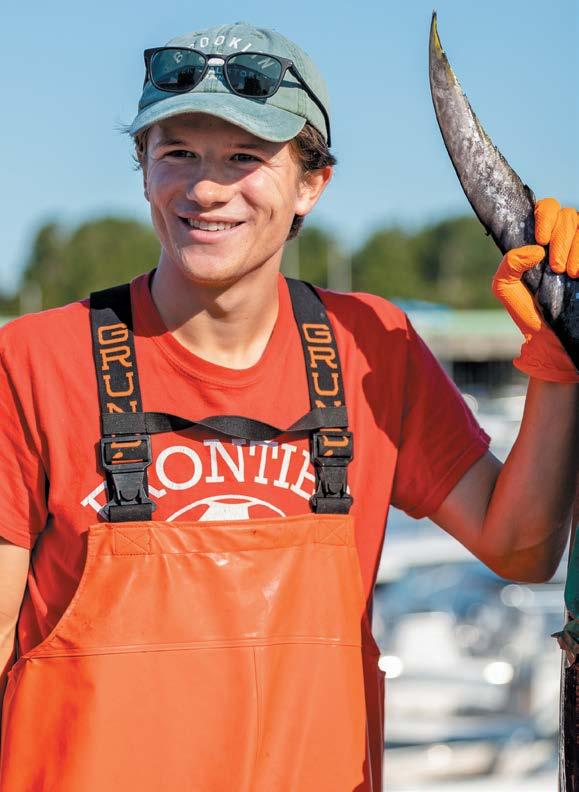
GALLUP-BATES RESEARCH
A nationwide study of college students, parents, and recruiters of recent grads found:
Less than half of college graduates nationwide find purposeful work
Graduates who align their work with their interests, values, and strengths are three times more likely to experience high purpose in work
Graduates with high purpose in work are 10 times more likely to have high overall wellbeing
tunafin
Purpose and Meaning
PURPOSEFUL WORK LEADER HELPS STUDENTS MAKE FULFILLING CHOICES
Hoi Ning Ngai of the Bates Center for Purposeful Work has a notion. A couple of them, in fact. She and the team at the center “focus on the notion of purpose and the notion of meaning.”

Highly regarded in U.S. higher education for its distinctive approach to career preparation, the Bates Center for Purposeful Work is led by talented professionals like Ngai who guide students as they explore and reflect on common themes in their academic work, campus and community activities, and relationships with peers and mentors.
And there’s lots to explore. From paid summer internships to academic courses taught by visiting practitioners in fields like digital marketing and national security journalism, the Bates Center for Purposeful Work helps students identify paths toward work and careers that feel purposeful and meaningful to them — discovering the joy and power that arise from aligning who they are with what they do.
Ngai highlights the questions that students should ask themselves: “What are the things that I am interested in? Why am I interested in them? What are my strengths, what are my values?” The answers, Ngai says, help contribute to “feeling fulfilled, whether at Bates, in work, or with anything you're looking to do in life.”


ABOVE: Kendall Williams ’23 of Phenix City, Ala., used a Purposeful Work internship to explore international consulting with the firm Accenture in Houston.
Ning Ngai

In order to consider and find purpose and meaning in life, we need to engage in deep exploration and critical reflection about what we truly care about.”
Practical Tools and Teaching
INTERNSHIPS AND JOB SHADOWING:
Bates Purposeful Work Internship Program offers 120 paid summer internships a year, drawing on a network of 70 core employers. Job shadowing also allows students to share a day in the life of alumni at workplaces such as Netflix, Nike, and the U.S. Centers for Disease Control and Prevention (CDC).
PURPOSEFUL WORK INFUSION PROJECT:
Across the curriculum, in over 53 Purposeful Work Infusion classes last year, Bates professors addressed the question, “How does the material we are studying relate to our understanding of purpose and work?”
PRACTITIONER-TAUGHT COURSES:
We invite alumni and other leaders in their fields to teach during Short Term. These fast-paced classes let students gain practical skills, expand their networks, and understand workplace dynamics.
PURPOSEFUL WORK UNPLUGGED:
This Q&A with alumni features stories of success and failure, lessons learned, and purposeful work in their own lives. Recent participants include an Instagram content strategist, a New York Times editor, a venture capitalist, and several CEOs.
HOW TO ADULT WORKSHOPS:
Many of the hard lessons of adulthood come soon after graduation, so Bates’ residence life staff and the Center for Purposeful Work aim to give students a head start. Workshop topics include how to budget in your 20s, negotiate a salary, find an apartment, or make new friends after college.

RECENT PRACTITIONERTAUGHT COURSES
Tuck Business Essentials taught by a Bates alumnus and Tuck Business School faculty
Media Literacy: Is That True? taught by an alumna and CNN vice president
Spies, Secret Agents, and the Presidency taught by an alumna and former U.S. intelligence analyst
Orthopedic Healthcare Practicum: Practical and Social Complexities of U.S. Healthcare Delivery taught by a Bates alumnus and physician
THE BATES APPROACH
After four years of exploration, discovery, and practical experience, Bates students have a strong sense of who they are. They’re confident about where they want to go, what they want to be, and how they will contribute to their communities.
For some, that means going straight into a new job in finance, education, or government. For others, it’s entrepreneurship, graduate study, professional degrees, or fellowships abroad.
Whatever they choose to pursue, our graduates’ self-confidence has been forged through a very Bates approach to life — one in which you learn to adapt by:
TESTING IT OUT
DEVELOPING A THEORY AND CREATING A PROTOTYPE

REFLECTING ON THE RESULT
MAKING IT BETTER
TRYING AGAIN
This way of thinking means that there are no mistakes or dead ends. Each experience propels you into what’s next — allowing you to create a new way forward, without boundaries or limits.
*Then starting over again with the next challenge.
COMMITTED TO AFFORDABILITY
Sometimes figuring out if you can afford college is as stressful as choosing where to go.
As you consider Bates, you can be confident that the spirit of openness that inspired our founders lives on in our commitment to affordability.
Because of our mission to be accessible to as many students as possible, Bates doesn’t offer financial aid based on your grades or athletic ability. Our entire financial aid budget supports students with financial need.
We will meet 100% of that calculated need all four years This may be through a combination of grants, payment plans, on-campus jobs, and loans.
Each family’s budget is different. Our financial aid team will work with you one-on-one to find a solution that puts a Bates education within reach.
Financial Aid Fast Facts
Bates is committed to making our educational experience accessible and affordable to all admitted students.
Find answers to your questions at:
More than $45 million in institutional grant aid in 2024–25
When you study abroad, your aid travels with you
Nearly half of our students receive financial aid
The average need-based grant for the Class of 2028 was $61,528
Post-Graduate Outcomes
of respondents were settled in a job, graduate school, or internship within six months of their graduation
of graduates who applied were accepted to medical school
of graduates who applied were accepted to dental and veterinary school who applied were accepted to law school
WHAT WILL YOU DO AFTER BATES?
At Bates, enabling students to lead lives of meaningful work is at the heart of our liberal arts mission.
Find details about Bates graduate outcomes from the annual survey conducted by Purposeful Work.
Recent Bates graduates are employed by some of the top performing and most innovative organizations in the world, including:
Fidelity Investments
Boston Children’s Hospital
Massachusetts General Hospital
Harvard University
Liberty Mutual Insurance
Amazon
Harvard Medical School
Analysis Group
Wellington
Management
Bates has been named a Fulbright Top Producer every year for the past 14 years.



Always a Bobcat
You’ll find Bates alumni across the world and around the corner. They’re building a new learning community in Vietnam, running an organic blueberry farm in Maine, serving in Congress, launching tech startups in New York, and representing their home countries in the Olympic Games.
They want to support you, too. Thousands of alumni mentor recent graduates, conduct admission conversations, open their workplaces for job-shadowing, and organize Bates events in their hometowns. Connecting with them is easy through Bates Bridge, the Center for Purposeful Work’s student-to-alumni connection network.





PICTURED: 1. Nick Lindholm ’86, organic blueberry farmer; 2. Bryant Gumbel ’70, broadcast journalist; 3. Elizabeth Strout ’77, bestselling author; 4. Marcus and Malcolm Delpeche ’17, professional basketball players; 5. Joyce White Vance ’82, former US Attorney and current MSNBC analyst; 6. Eva Meltzer Murray ’85, year-round resident and jill-of-all-trades on Matinicus Isle; 7. Lindsey Hamilton ’05, director of the Center for Inclusive Teaching and Learning; 8. Megan Guynes ’11, nonprofit program director.
Shaking Up Higher Education
BATES ALUMNA BRINGS LIBERAL ARTS TO VIETNAM
Ngan Dinh ’02 didn’t initially set out to create Bates’ mirror image in Vietnam. But after a career as an economics consultant and professor, she’s doing just that.
Dinh is the founding dean of undergraduate studies at Fulbright University Vietnam, the country’s first liberal arts college.
“We are still in the first year,” she says. “Technically, we are a baby.”
Even in its infancy, the college in Ho Chi Minh City feels a lot like Bates. And it looks nothing like Vietnam’s traditional approach to higher education, where you choose a major at 18 and study only that subject for four years.
Fulbright University students learn to build machines using just bamboo and string. They hop from courses in Vietnamese studies to engineering to the arts, and then decide in year two or three what to
focus on. They experiment, test theories, talk back to professors — respectfully and enthusiastically.
Dinh always wanted to be of service in her home country, says retired Bates Dean of Admission Bill Hiss ’66, a longtime friend and mentor. When the Fulbright organization tapped Dinh to start a new university, she turned to the model that she knew well.
“She said sort of playfully, ‘Bill, I have to build Bates in Vietnam.’ And that’s exactly what she’s doing.”
“Ngan is encouraging the students at Fulbright to have that same sort of curious, open, involved, and questioning approach to their education.”

Ngan Dinh ’02
Mt. David (a quick mountain view)
Ladd Library
(lots of study nooks)

Commons (top-notch dining)
Maine fall foliage (nothin’ like it!)
The Bobcat (just turned 100!)
Garcelon Field (for all the athletic moves)

EXPLORE AND VISIT
There are lots of great ways to get to know Bates. View our online guided tour, attend an information session, and, of course, check out bates.edu New resources are being designed and added all the time, so please check back at bates.edu/visit regularly to see what’s new and view up-to-date campus visitor policies.
Visit regularly




YOU
CAN BE OPEN HERE.

The (aptly named) Maine Coast Chillin’ trip at Hermit Island Campground explores the sites of Maine’s coast (and beaches!) just south of the Brunswick/Bath area. On this first-year orientation trip, you’ll take excursions to the Bates-Morse Mountain Conservation Area, as well as to nearby Popham Beach State Park.
CONNECT WITH US
JOIN THE CONVERSATION
Ready to talk about Bates with an expert? After exploring campus (virtually or in-person) or attending an information session, strike up an email conversation with a current student, reach out to your regional admission representative, or request an interview with a Bates alumnus near you. Details are at bates.edu/admission
For a candid view of Bates, follow “@batescollege” on Instagram, YouTube, Facebook, X, LinkedIn, and TikTok.

WHO WE ARE
To see the latest class profile, read the Bates Mission, and explore more facts, visit bates. edu/admission/student-profile
NOTIFICATION OF NON-DISCRIMINATION POLICY
APPLY TO BATES
For information on applying to Bates, including requirements (we are test-optional!), options, and deadlines, visit bates.edu/apply.
MORE INFORMATION
1-207-786-6000 bates.edu/admission admission@bates.edu 23 Campus Avenue Lewiston, ME 04240
STUDENT FINANCIAL SERVICES
1-207-786-6096 bates.edu/sfs sfs@bates.edu 44 Mountain Avenue Lewiston, ME 04240
Bates College is committed to the principle of equal opportunity and providing an educational and work environment free from discrimination. The college prohibits discrimination on the basis of race, color, national or ethnic origin, religion, sex, sexual orientation, gender identity or gender expression, age, disability, genetic information, or veteran status and other legally protected statuses in the recruitment and admission of its students, in the administration of its education policies and programs, or in the recruitment of its faculty and staff. Bates College adheres to all applicable state and federal equal opportunity laws and regulations.
Inquiries concerning the college’s policies, compliance with applicable laws, statutes, and regulations (such as Title VII, Title IX, ADA/Section 504, and Maine Human Rights Act), and complaints may be directed to Gwen Lexow, Director of Title IX and Civil Rights Compliance, glexow@bates.edu or 207-786-6445.
© Bates College 25-031
